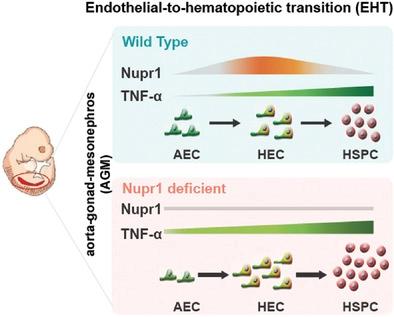Our official English website, www.x-mol.net, welcomes your
feedback! (Note: you will need to create a separate account there.)
Nupr1 Negatively Regulates Endothelial to Hematopoietic Transition in the Aorta-Gonad-Mesonephros Region
Advanced Science ( IF 14.3 ) Pub Date : 2023-01-13 , DOI: 10.1002/advs.202203813 Haizhen Wang 1 , Di Liu 2 , Haifeng Chen 1 , Yuqing Jiao 3 , Haixin Zhao 4 , Zongcheng Li 4 , Siyuan Hou 1, 5 , Yanli Ni 4 , Rong Zhang 6 , Jinyong Wang 7 , Jie Zhou 4, 8 , Bing Liu 1, 4, 8 , Yu Lan 1
Advanced Science ( IF 14.3 ) Pub Date : 2023-01-13 , DOI: 10.1002/advs.202203813 Haizhen Wang 1 , Di Liu 2 , Haifeng Chen 1 , Yuqing Jiao 3 , Haixin Zhao 4 , Zongcheng Li 4 , Siyuan Hou 1, 5 , Yanli Ni 4 , Rong Zhang 6 , Jinyong Wang 7 , Jie Zhou 4, 8 , Bing Liu 1, 4, 8 , Yu Lan 1
Affiliation

|
In the aorta of mid-gestational mouse embryos, a specialized endothelial subpopulation termed hemogenic endothelial cells (HECs) develops into hematopoietic stem and progenitor cells (HSPCs), through a conserved process of endothelial-to-hematopoietic transition (EHT). EHT is tightly controlled by multiple intrinsic and extrinsic mechanisms. Nevertheless, the molecular regulators restraining this process remain poorly understood. Here, it is uncovered that, one of the previously identified HEC signature genes, Nupr1, negatively regulates the EHT process. Nupr1 deletion in endothelial cells results in increased HSPC generation in the aorta-gonad-mesonephros region. Furthermore, single-cell transcriptomics combined with serial functional assays reveals that loss of Nupr1 promotes the EHT process by promoting the specification of hematopoiesis-primed functional HECs and strengthening their subsequent hematopoietic differentiation potential toward HSPCs. This study further finds that the proinflammatory cytokine, tumor necrosis factor α (TNF-α), is significantly upregulated in Nupr1-deficient HECs, and the use of a specific TNF-α neutralizing antibody partially reduces excessive HSPC generation in the explant cultures from Nupr1-deficient embryos. This study identifies a novel negative regulator of EHT and the findings indicate that Nupr1 is a new potential target for future hematopoietic stem cell regeneration research.
中文翻译:

Nupr1 负向调节主动脉-性腺-中肾区内皮细胞向造血细胞的转变
在妊娠中期小鼠胚胎的主动脉中,一种称为造血内皮细胞 (HEC) 的特殊内皮亚群通过保守的内皮-造血转化 (EHT) 过程发育成造血干细胞和祖细胞 (HSPC)。EHT 受到多种内在和外在机制的严格控制。然而,人们对抑制这一过程的分子调节剂知之甚少。在这里,发现先前发现的 HEC 特征基因之一 Nupr1 负向调节 EHT 过程。Nupr1内皮细胞的缺失导致主动脉-性腺-中肾区域 HSPC 生成增加。此外,单细胞转录组学与系列功能测定相结合表明,Nupr1 的缺失通过促进造血引发的功能性 HEC 的规范和增强其随后向 HSPC 的造血分化潜能来促进 EHT 过程。本研究进一步发现,促炎细胞因子、肿瘤坏死因子α (TNF- α ) 在 Nupr1 缺陷型 HEC 中显着上调,并且使用特定的 TNF- α中和抗体部分减少了 Nupr1 缺陷胚胎的外植体培养物中过多的 HSPC 生成。这项研究确定了一种新的 EHT 负调节因子,研究结果表明 Nupr1 是未来造血干细胞再生研究的一个新的潜在靶标。
更新日期:2023-01-13
中文翻译:

Nupr1 负向调节主动脉-性腺-中肾区内皮细胞向造血细胞的转变
在妊娠中期小鼠胚胎的主动脉中,一种称为造血内皮细胞 (HEC) 的特殊内皮亚群通过保守的内皮-造血转化 (EHT) 过程发育成造血干细胞和祖细胞 (HSPC)。EHT 受到多种内在和外在机制的严格控制。然而,人们对抑制这一过程的分子调节剂知之甚少。在这里,发现先前发现的 HEC 特征基因之一 Nupr1 负向调节 EHT 过程。Nupr1内皮细胞的缺失导致主动脉-性腺-中肾区域 HSPC 生成增加。此外,单细胞转录组学与系列功能测定相结合表明,Nupr1 的缺失通过促进造血引发的功能性 HEC 的规范和增强其随后向 HSPC 的造血分化潜能来促进 EHT 过程。本研究进一步发现,促炎细胞因子、肿瘤坏死因子α (TNF- α ) 在 Nupr1 缺陷型 HEC 中显着上调,并且使用特定的 TNF- α中和抗体部分减少了 Nupr1 缺陷胚胎的外植体培养物中过多的 HSPC 生成。这项研究确定了一种新的 EHT 负调节因子,研究结果表明 Nupr1 是未来造血干细胞再生研究的一个新的潜在靶标。





















































 京公网安备 11010802027423号
京公网安备 11010802027423号